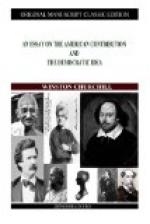Almost up to the present day, both in our conception and practice of Christianity, we have largely neglected its most important elements. Christian orthodoxy, as Auguste Sabatier points out, is largely derived from the older supernatural religions. The preservative shell of dogma and superstition has been cracking, and is now ready to burst, and the social teaching of Jesus would seem to be the kernel from which has sprung modern democracy, modern science, and modern religion—a trinity and unity.
For nearly two thousand years orthodoxy has insisted that the social principles of Christianity are impractical. And indeed, until the present day, they have been so. Physical science, by enormously accelerating the means of transportation and communication, has so contracted the world as to bring into communion peoples and races hitherto far apart; has made possible an intelligent organization of industry which, for the first time in history, can create a surplus ample to maintain in comfort the world’s population. But this demands the will to co-operation, which is a Christian principle—a recognition of the brotherhood of man. Furthermore, physical science has increased the need for world peace and international co-operation because the territories of all nations are now subject to swift and terrible invasion by modern instruments of destruction, while the future submarine may sweep commerce from the seas.
Again, orthodoxy declares that human nature is inherently “bad,” while true Christianity, endorsed by psychology, proclaims it inherently “good,” which means that, properly guided, properly educated, it is creative and contributive rather than destructive. No more striking proof of this fact can be cited than the modern experiment in prison reform in which hardened convicts, when “given a chance,” frequently become useful citizens. Unjust and unintelligent social conditions are the chief factors in making criminals.
Our most modern system of education, of which Professor John Dewey is the chief protagonist, is based upon the assertions of psychology that human nature is essentially “good” creative. Every normal child is supposed to have a special “distinction” or gift, which it is the task of the educator to discover. This distinction found, the child achieves happiness in creation and contribution. Self-realization demands knowledge and training: the doing of right is not a negative but a positive act; it is not without significance that the Greek word for sin is literally “missing the mark.” Christianity emphasizes above all else the worth of the individual, yet recognizes that the individual can develop only in society. And if the individual be of great worth, this worth must be by society developed to its utmost. Universal suffrage is a logical corollary.
Universal suffrage, however, implies individual judgment, which means that the orthodox principle of external authority is out of place both in Christianity and democracy. The Christian theory is that none shall intervene between a man’s Maker and himself; democracy presupposes that no citizen shall accept his beliefs and convictions from others, but shall make up his own mind and act accordingly. Open-mindedness is the first requisite of science and democracy.




